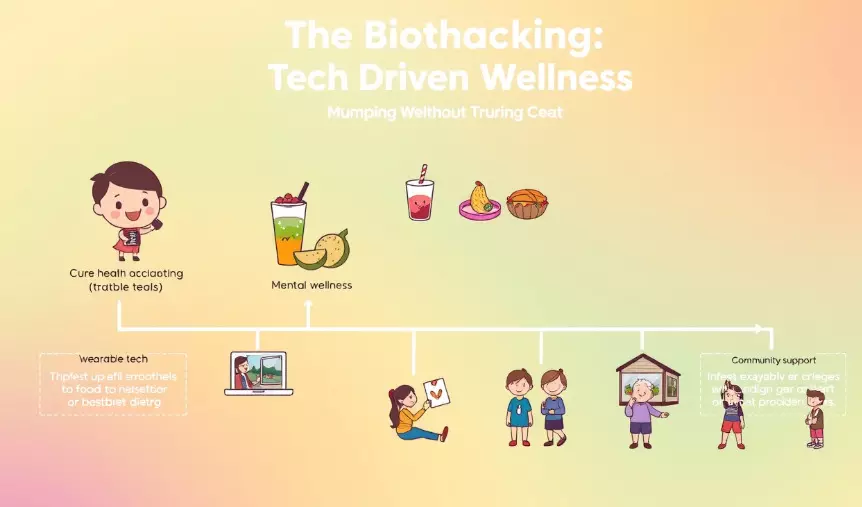The Biohacking Alternative: Tech-Driven Wellness Without Extreme Diets
image for illustrative purpose

Have you ever stopped to think about how many people are stuck in the cycle of traditional diets? Surprisingly, around 60% have tried multiple diets over five years, yet only 20% maintain their weight loss after just one year. It's frustrating when studies show that most regain the weight within two years of restrictive eating! This highlights a crucial question: why do these conventional methods often fall short? But what if there’s a smarter, tech-driven alternative waiting for you? Let’s explore this together…
When tech entrepreneur Mark R. decided to optimize his health, he went all-in on a strict ketogenic diet—cutting carbs to near zero while loading up on fats. "My coach swore this was the ultimate biohack," he recalled. But three weeks in, his energy levels crashed. "I was dragging myself through meetings, and my team started asking if I was sick." Bloodwork revealed plummeting thyroid function, and his doctor bluntly warned, "Your body thinks it’s starving." The real kicker? His sleep tracker showed restless nights despite meticulous supplementation. "I kept tweaking ratios, adding MCT oil, even doing cold plunges—nothing moved the needle," he admitted, staring at his spreadsheet of failed experiments. Just as he was about to abandon the plan entirely, a colleague slid him a research paper titled *Metabolic Flexibility Over Dogma*—and suddenly, the problem wasn’t his willpower, but the approach itself.
Mark’s breaking point came during a client pitch—the kind he’d normally crush. Halfway through his slides, his mind went blank. "I just... froze," he muttered later, replaying the disaster. His CTO had to jump in while the room buzzed with awkward coughs. Back at the office, whispers started. "People brought me keto snacks like I was some lab rat," he groaned. His assistant began scheduling midday naps without asking. Worst of all? His biggest competitor launched a wellness podcast that week—featuring their CEO hiking with a glucose monitor, casually name-dropping "metabolic flexibility." Mark’s spreadsheet of biohacks suddenly looked like a relic. That’s when it hit him: he wasn’t just failing his body. He was losing credibility.
As his team debated pivoting strategies, someone slid a Post-it across the table: *What if we’re optimizing the wrong thing?*
**Biohacking Alternatives FAQ: Your Top Concerns Addressed**
### "Wait, isn’t biohacking just another buzzword for extreme diets?" 🤔
Not at all! While biohacking *can* include dietary tweaks, it’s really about **self-optimization through tech and data**. Think wearables tracking your sleep cycles, apps nudging you to hydrate, or even blue-light blockers for better focus—no kale smoothies required.
### "I’ve heard horror stories about nootropics and weird gadgets… is this actually safe?" 🚨
Great question! Like any wellness trend, biohacking has its gray areas. 💡 **Pro tip**: Start with low-stakes tools like a basic fitness tracker or mindfulness apps before diving into advanced hacks. And *always* consult a doctor before trying supplements like adaptogens or peptides—your body isn’t a lab rat!
### "But doesn’t all this tech get expensive? 💸"
It *can*—but it doesn’t have to. A $50 sleep sensor might save you years of guesswork, while free apps like MyFitnessPal offer solid data tracking. Compare that to the cost of chronic burnout or poor metabolic health… suddenly, biohacking feels like a bargain.
### "Okay, but does any of this *actually* work?" 🧐
Solid skepticism! Studies show tech-driven interventions (like glucose monitors for non-diabetics) can reveal hidden health patterns. One user told me tracking her HRV (heart rate variability) helped her spot stress triggers *before* they caused meltdowns. 📊 Data doesn’t lie—but it’s about finding what works for *your* biology.
### "Honestly, I’m overwhelmed—where do I even start?" 🌱
Start small! Pick *one* pain point (low energy? poor sleep?) and try **one tool** for 30 days. Maybe it’s a sunrise alarm clock or a 5-minute breathing exercise. Biohacking isn’t about overhauling your life overnight—it’s about tiny, sustainable upgrades.
**So… is biohacking *your* missing link to better wellness?** Discover more Q&A content [click here]
When exploring "Root Causes: The Hidden Factors Sabotaging Your Wellness," it’s important to look at how chronic stress, poor sleep quality, and nutritional deficiencies can undermine our health. Some experts argue that tech-driven solutions, like stress management apps or personalized nutrition trackers, offer a way to navigate these issues without resorting to extreme diets. But is this approach truly one-size-fits-all?
While many embrace the potential of biohacking for improved wellness, there are concerns about reliance on technology potentially leading to market monopolies. And what about the role of gut health, environmental toxins, and a sedentary lifestyle? These factors can't be overlooked either. As we consider these complexities, one has to wonder: if this trend continues gaining traction, how should we adapt our wellness strategies?
To kick off your biohacking journey, start by establishing your baseline metrics. Track your resting heart rate, sleep quality through a wearable like the Oura Ring, and key blood markers such as glucose and cortisol. This initial data will give you a clear picture of where you're starting from.
Next up is selecting your tech stack. Consider using apps or devices like Levels for metabolic tracking or WHOOP for recovery insights. These tools provide real-time data that'll help you make informed adjustments along the way.
Now, let’s dive into micro-experiments! Try implementing cold showers or blue light blocking glasses for two-week cycles. Keep an eye on how these changes affect your metrics—this is where the fun begins!
💡 Quick tip: Set adjustment triggers based on specific thresholds; for instance, if your sleep score drops below 85, it might be time to cut back on caffeine.
Finally, don’t forget about feedback loops! Review your progress weekly using the data you've gathered and tweak your protocols accordingly. If something isn't working as expected, pivot with confidence—you’ve got this!
If these steps still leave you scratching your head, remember that biohacking is all about exploration; there could be other hidden challenges waiting to be uncovered!

